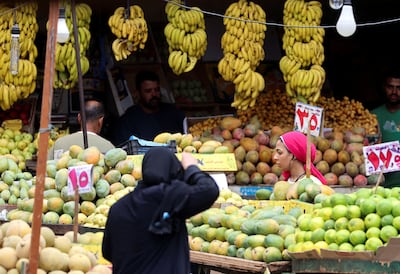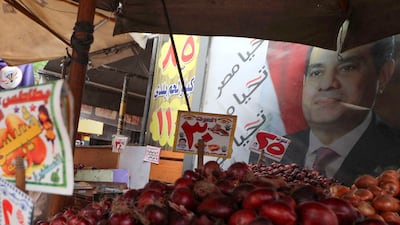Egypt’s annual headline inflation reached 38 per cent in September, marking the fourth consecutive month of record-high inflation numbers in the cash-strapped North African country, data from the country’s statistics agency showed on Tuesday.
On a monthly basis, the country’s inflation rate rose to 2 per cent, continuing an upwards trend that began in March last year, according to the Central Agency for Public Mobilisation and Statistics.
The increase in annual inflation came in slightly above the 37.6 per cent predicted by Goldman Sachs in its monthly forecast on Egypt, which attributed it to seasonality and low inventories.
Although only marginal increases were recorded across the board, vegetable prices witnessed a sizeable rise of 19.2 per cent, mainly on the back of lower supplies after crop harvests were adversely impacted by one of the hottest summers on record, Hatem El Naguib, vice president of Egypt’s vegetable producers union, told The National.
Fruit prices witnessed a more modest rise of 5.4 per cent, Capmas data showed.
Additionally, bread and cereal prices decreased by 1.3 per cent compared to August, after decreasing by a similar amount from July.
Egypt has devalued its currency three times since March 2022, and the pound has lost more than half its value since then.
The Arab world's third-largest economy has been facing a dollar crunch and mounting foreign debt. On Monday, the country's banks announced a suspension of all debit card transactions in foreign currency until further notice following instructions from the country's central bank in a bid to curb FX spending.
In May, Fitch Ratings revised Egypt's outlook to negative and gave the country its first downgrade since 2013, citing the lack of economic reforms and challenges to its fiscal system.

The country's long-term foreign currency issuer default rating was revised to 'B' from 'B+', five levels below investment grade, the rating agency said.
The Egyptian government announced last week a new scheme through which it aims to bring down food prices by between 15 and 25 per cent for the next six months.
The move is widely considered to be politically-motivated as it will serve as one of the best promotional tools for the campaign of President Abdel Fattah El Sisi, who is largely expected to run for another term in office when the election concludes in December.
As Egypt’s government moves to bring down food prices for an increasingly impoverished populace, Goldman Sachs predicts the country’s annual headline reading to drop next month “on account of consolidating prices in the local market”.


